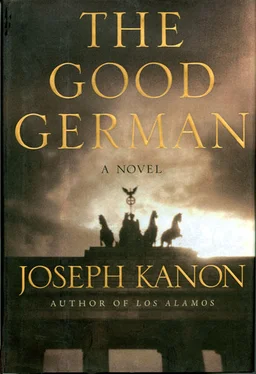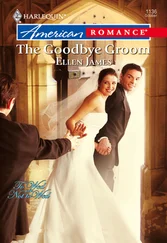“Like Potsdam.” ‹›Muller looked up at him. “Like Potsdam. There’s nothing we can do there.“ ‹›“What about off the street? This much money-somebody must be running things.“
“You mean gangs? Professionals? That I don’t know. And I’d doubt it. You hear rumors about the DPs, but people like to blame the DPs for everything. Nobody polices them. The kind of thing you’re talking about, you’d have to go back to Bavaria or Frankfurt, where there’s still something to steal. Warehouses. Big hoardings. It happens, and I suppose Frankfurt must have somebody on it, if you’re interested. But Berlin? It’s been picked pretty clean. What you’ve got here is a lot of small money that adds up.”
“That’s a fair description of the numbers racket too.” A reluctant smile. “I guess.” Muller paused, spreading his hands on the desk. “Look. A soldier sells a watch. Maybe he shouldn’t, and maybe you don’t think we’re doing enough to stop him. But I’ll tell you this-I’ve seen lots of men die in the last few years. Ripped up, holding their guts in. Good men. Kids. Nobody thought they were criminals then. Now they’re picking up a few bucks. Maybe it’s wrong, but you know what? I’m still a soldier. I think they’re worth two million a month.” ‹›“So do I,” Jake said slowly. “I just don’t like to see them get shot. It doesn’t seem right. For a watch.” Muller looked at him, disconcerted, then lowered his head. “No. Well. Is there anything else?”
“Lots, but you’ve got a meeting to get to,” Jake said, standing up. “I don’t want to wear out my welcome.”
“Any time,” Muller said pleasantly, also getting up, relieved. “That’s what we’re here for.”
“No, you’re not. I appreciate the time.” Jake folded the flimsies into his pocket. “And these. Oh, one more thing. Can I see the body?” “The body?” Muller said, literally taking a step back in surprise. “I thought you had seen it. Isn’t that why we’re here? It’s-gone. It was shipped back to Frankfurt.” “That was fast. No autopsy?”
“No,” Muller said, slightly puzzled. “Why would there be an autopsy? We know how he died. Should there have been one?”
Jake shrugged. “At least a coroner’s report.” He caught Muller’s expression. “I know. You’re not Scotland Yard. It’s just a little skimpy, that’s all,” he said, patting the sheets in his pocket. “It might have helped to examine it. I wish you’d waited.”
Muller looked at him, then sighed. “You know what I wish, Geismar? I wish you’d never gone to Potsdam.”
Jeanie was arranging her set of carbons when he came out. She looked up and smiled without stopping, like a casino dealer, shuffling the third sheet to the bottom, then tossing the folder into an out box for filing. “All set?”
Jake smiled back. The army never changed, a world run in duplicate. He wondered if there was another girl to do the filing to save those wonderful nails. “For now,” he said, still smiling, but she took it as a pass, arching her eyebrows and shooting him a look.
“We’re here nine to five,” she said, a dismissal.
“That’s good to know,” he said, playing along. “Colonel keep you pretty busy? ”
“All the live-long day. Stairs are down the hall to your right.”
“Thanks,” he said, lifting his fingers to his forehead in a salute.
On the entrance steps he was blinded by the light and shaded his eyes to get his bearing. The sun, already hot, was streaming in from the east, filtering through the dust that hung over the ruins beyond the graceful colonnades. The work party, bent over their rakes, had got rid of their shirts but not, Jake noticed, their initials, P on one trouser leg, W on the other. The war had branded everybody, even Tully, now just some initials on a carbon flimsy.
He stood for a minute, his mind full of engraving plates and watch prices, all of which led him nowhere. Which was probably where Muller wanted him to go. He smiled to himself, thinking of Jeanie- two brush-offs in one morning, one more direct than the other. It was Muller who’d taken the circular way around, leaving him back on the steps not even sure he’d been through a revolving door. Except something nagged, a missing crossword piece that would leap to the eye if you looked at it long enough. He told the driver he wanted to walk.
“Walk?” the soldier said, amazed. “You mean back?”
“No meet me at Zoo Station in about an hour. You know where that is?“
The soldier nodded. “Sure. It’s a hike from here.”
“I know. I like to walk. Helps me think.” Explaining himself. He made a mental note to ask Ron for his own jeep.
But the soldier, like Jeanie, had been around. “I get it. You sure you don’t want me to drop you? I mean, I don’t care, it’s your business.”
Everybody does it, Jake thought as he headed across the battered park; a lot of small money that adds up. So whom had Tully done business with? A gun-happy Russian? A DP with nothing to lose? Anybody. Five thousand dollars, more. People got killed every day in Chicago for less, just for skimming a numbers collection. Life would be even cheaper than that here. But why come in the first place? Because the Russians were here, flush with cash. Not porcelain knickknacks and old silver to trade. Cash. Honey for bears. Everybody does it.
The park gates opened onto lower Potsdamerstrasse and a small stream of military trucks and civilians on rickety bicycles, all that was left of the traffic that used to roar by to the center. On foot Berlin was a different city, not the spectacle he’d seen from a touring jeep but something grittier, a wreck in closeup. He had loved walking in the city, exploring the miles of flat, irregular streets as if just the physical touch of shoe leather made it personal, brought him into its life. Sundays in the Grunewald. Afternoons wandering through districts where the other journalists never went, Prenzlauer or the tenement streets in Wedding, just to see what they were like, his eyes gliding from building to building, oblivious to curbs. Now he had to step carefully, skirting clumps of broken cement and picking his way through plaster and glass that crunched underfoot. The city had become a trail hike, full of obstacles and sharp things hidden under stones. Steel rods twisted into spiky shapes, still black from fire. The familiar rotting smell. At the corner of Pallasstrasse, the remains of the Sportpalast, where bicycles used to whiz by in the rac-ing oval and Hitler promised the faithful a thousand years. Only the giant flak tower was standing, like the ones at the zoo, too sturdy even for boombs. A soldier was propped against the wall with one hand, talking to a girl and fondling her hair, the oldest black market in the world. Across tile street, a few other girls in thin dresses leaned against a standing wall, gesturing to convoy trucks. At ten o’clock in the morning.
The side streets were clogged with debris, so he kept to the main roads, turning left on Bulowstrasse for the long walk up to the zoo. This was a part of town he’d known well, the elevated station hulking over Nollendorfplatz, with its ring of bars. A movie marquee had slid down to the pavement nearly intact, as if the building had been whipped out from under it, like the magic trick with a tablecloth. A few people were out, one of them pushing a baby carriage filled with household goods, and Jake realized that the dazed, plodding movement he’d seen from the jeep two days ago was the new pace of the city, as careful as his own. Nobody walked quickly over rubble. Why would anyone come to Berlin? Had Tully been before? There must be traveling orders, something to check. The army ran in duplicate.
More blocks of collapsed buildings, more groups of women in headscarves and old uniform pants, cleaning bricks. A woman in heels stepped out of one building, smartly dressed, as if she were heading up the street as usual for some shopping at KaDeWe. Instead she wobbled over some broken plaster to a waiting army car and straightened her nylons as she pulled her legs in, a different kind of excursion. And KaDeWe, in any case, was gone, ripped through by bombs and sagging into Wittenbergplatz, not even a window mannequin left. They used to meet here sometimes, by the wurst stands on the food floor, where you were likely to run into anybody, then leave separately for Jake’s flat across the square. Taking different sides so that Jake could see her through the crowd as he waited at the stoplight, watching to see that no one followed. No one did. A game to make it more exciting, getting away with something. Then up the stairs where she’d be waiting, a ring to make sure Hal was out, and inside, sometimes grabbing each other even before the door clicked shut. The flat would be gone now too, like the afternoons, a memory.
Читать дальше












